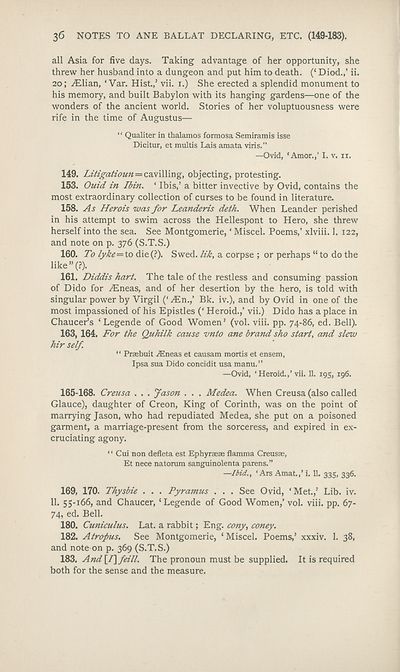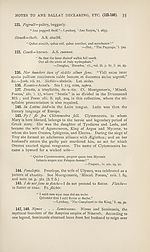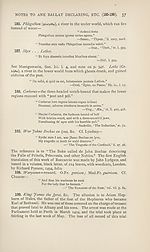Scottish Text Society publications > Old series > Satirical poems of the time of the reformation > Volume 2, 1893
(52)
Download files
Complete book:
Individual page:
Thumbnail gallery: Grid view | List view

36 NOTES TO ANE BALLAT DECLARING, ETC. (149-183).
all Asia for five days. Taking advantage of her opportunity, she
threw her husband into a dungeon and put him to death. (‘ Diod.,’ ii.
20; iElian, ‘Van Hist.,’ vii. 1.) She erected a splendid monument to
his memory, and built Babylon with its hanging gardens—one of the
wonders of the ancient world. Stories of her voluptuousness were
rife in the time of Augustus—
“ Qualiter in thalamos formosa Semiramis isse
Dicitur, et multis Lais amata viris."
—Ovid, ‘Amor.,’ I. v. it.
149. Litigatioun — zz.v\\X\w%, objecting, protesting.
153. Quid in Ibin. ‘ Ibis,’ a bitter invective by Ovid, contains the
most extraordinary collection of curses to be found in literature.
158. As Herois was for Leanderis deth. When Leander perished
in his attempt to swim across the Hellespont to Hero, she threw
herself into the sea. See Montgomerie, ‘ Miscel. Poems,’ xlviii. 1. 122,
and note on p. 376 (S.T.S.)
160. To fyke=to die(?). Swed.a corpse ; or perhaps “to do the
like ” (?).
161. Diddis hart. The tale of the restless and consuming passion
of Dido for ^Eneas, and of her desertion by the hero, is told with
singular power by Virgil (‘^En.,’ Bk. iv.), and by Ovid in one of the
most impassioned of his Epistles (‘ Heroid.,’ vii.) Dido has a place in
ChaucePs ‘ Legende of Good Women’ (vol. viii. pp. 74-86, ed. Bell).
163, 164. For the Quhilk cause vnto ane brand sho start, and slew
hir self.
“ Prasbuit Aineas et causam mortis et ensem,
Ipsa sua Dido concidit usa manu.”
—Ovid, ' Heroid.,’vii. 11. 195, 196.
165-168. Creusa . . . Jason . . . Medea. When Creusa (also called
Glauce), daughter of Creon, King of Corinth, was on the point of
marrying Jason, who had repudiated Medea, she put on a poisoned
garment, a marriage-present from the sorceress, and expired in ex¬
cruciating agony.
“ Cui non defleta est Ephyraeae flamma Creusae,
Et nece natorum sanguinolenta parens.”
—Ibid., ‘Ars Amat.,’ i. 11. 335, 336.
169, 170. Thysbie . . . Pyramus . . . See Ovid, ‘ Met.,’ Lib. iv.
11. 55-166, and Chaucer, ‘Legende of Good Women,’ vol. viii. pp. 67-
74, ed. Bell.
180. Cuniculus. Lat. a rabbit; Eng. cony, coney.
182. Atropus. See Montgomerie, ‘ Miscel. Poems,’ xxxiv. 1. 38,
and note on p. 369 (S.T.S.)
183. And [T}feill. The pronoun must be supplied. It is required
both for the sense and the measure.
all Asia for five days. Taking advantage of her opportunity, she
threw her husband into a dungeon and put him to death. (‘ Diod.,’ ii.
20; iElian, ‘Van Hist.,’ vii. 1.) She erected a splendid monument to
his memory, and built Babylon with its hanging gardens—one of the
wonders of the ancient world. Stories of her voluptuousness were
rife in the time of Augustus—
“ Qualiter in thalamos formosa Semiramis isse
Dicitur, et multis Lais amata viris."
—Ovid, ‘Amor.,’ I. v. it.
149. Litigatioun — zz.v\\X\w%, objecting, protesting.
153. Quid in Ibin. ‘ Ibis,’ a bitter invective by Ovid, contains the
most extraordinary collection of curses to be found in literature.
158. As Herois was for Leanderis deth. When Leander perished
in his attempt to swim across the Hellespont to Hero, she threw
herself into the sea. See Montgomerie, ‘ Miscel. Poems,’ xlviii. 1. 122,
and note on p. 376 (S.T.S.)
160. To fyke=to die(?). Swed.a corpse ; or perhaps “to do the
like ” (?).
161. Diddis hart. The tale of the restless and consuming passion
of Dido for ^Eneas, and of her desertion by the hero, is told with
singular power by Virgil (‘^En.,’ Bk. iv.), and by Ovid in one of the
most impassioned of his Epistles (‘ Heroid.,’ vii.) Dido has a place in
ChaucePs ‘ Legende of Good Women’ (vol. viii. pp. 74-86, ed. Bell).
163, 164. For the Quhilk cause vnto ane brand sho start, and slew
hir self.
“ Prasbuit Aineas et causam mortis et ensem,
Ipsa sua Dido concidit usa manu.”
—Ovid, ' Heroid.,’vii. 11. 195, 196.
165-168. Creusa . . . Jason . . . Medea. When Creusa (also called
Glauce), daughter of Creon, King of Corinth, was on the point of
marrying Jason, who had repudiated Medea, she put on a poisoned
garment, a marriage-present from the sorceress, and expired in ex¬
cruciating agony.
“ Cui non defleta est Ephyraeae flamma Creusae,
Et nece natorum sanguinolenta parens.”
—Ibid., ‘Ars Amat.,’ i. 11. 335, 336.
169, 170. Thysbie . . . Pyramus . . . See Ovid, ‘ Met.,’ Lib. iv.
11. 55-166, and Chaucer, ‘Legende of Good Women,’ vol. viii. pp. 67-
74, ed. Bell.
180. Cuniculus. Lat. a rabbit; Eng. cony, coney.
182. Atropus. See Montgomerie, ‘ Miscel. Poems,’ xxxiv. 1. 38,
and note on p. 369 (S.T.S.)
183. And [T}feill. The pronoun must be supplied. It is required
both for the sense and the measure.
Set display mode to: Large image | Zoom image | Transcription
Images and transcriptions on this page, including medium image downloads, may be used under the Creative Commons Attribution 4.0 International Licence unless otherwise stated. ![]()
| Publications by Scottish clubs > Scottish Text Society publications > Old series > Satirical poems of the time of the reformation > Volume 2, 1893 > (52) |
|---|
| Permanent URL | https://digital.nls.uk/107427383 |
|---|
| Attribution and copyright: |
|
|---|
| Description | A collection of over 100 Scottish texts dating from around 1400 to 1700. Most titles are in Scots, and include editions of poetry, drama, and prose by major Scottish writers such as John Barbour, William Dunbar, Gavin Douglas, and George Buchanan. Edited by a key scholarly publisher of Scotland's literary history, and published from the late 19th century onwards by the Scottish Text Society. Available here are STS series 1-3. |
|---|

